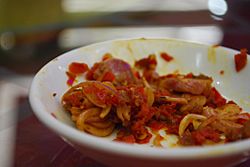Cincalok facts for kids

A bowl of cincalok
|
|
| Alternative names | Chinchalok, cencaluk, cencalok |
|---|---|
| Type | Condiment |
| Course | Appetizer or main course |
| Place of origin | Malacca |
| Region or state | Southeast Asia |
| Associated national cuisine | Brunei, Indonesia, Malaysia and Singapore |
| Serving temperature | hot or room temperature |
| Main ingredients | Small shrimp or krill |
Cincalok is a special Malay dish that comes from Malacca, Malaysia. It's enjoyed by different groups of people there, like the Malays, Peranakan, and Kristang. This unique food has roots going back to when the Portuguese were in Malacca.
In Malacca, the tiny shrimp used for cincalok are called udang geragau. Cincalok is made by fermenting these small shrimps or krill. It's usually served as a condiment, which means it's an extra flavor added to a meal. People often mix it with chillis, shallots, and lime juice.
The shrimp in cincalok are easy to spot because of their pinkish color. The taste is quite salty and unique. You can find these special shrimp during certain seasons along the coast of Malacca, in places like Pantai Klebang and Tanjung Kling.
Contents
What is Cincalok?
Cincalok is a traditional fermented food. It's made from very small shrimp or krill. The fermentation process gives it a distinct salty and tangy flavor. It's a popular side dish or ingredient in many Southeast Asian meals.
Where Cincalok is Popular
Cincalok is a big part of the food culture in Malacca, Malaysia. But its popularity has spread! You can also find it in Riau and West Kalimantan in Indonesia. It's similar to other fermented shrimp dishes found in the region. For example, it's like bagoong alamang in the Philippines or khoei chalu in Thailand.
Finding Cincalok Today
Making cincalok has become a growing business for many people in Malacca. The local government even supports this by promoting certain areas, like Sungai Udang, for cincalok production.
You can easily buy cincalok from roadside stalls and markets. If you travel along the coast from Tanjung Kling to Sungai Udang, you'll see many stalls selling both cincalok and belacan (another type of shrimp paste).
How Cincalok is Made
Making cincalok is a simple but careful process.
Gathering Ingredients
First, fresh small prawns, known as udang geragau, are collected. These tiny shrimp are the main ingredient.
Mixing and Fermenting
Next, the fresh shrimp are mixed with salt and rice. The amounts of shrimp, salt, and rice are usually equal. After everything is mixed well, the mixture is sealed tightly in a jar. It then ferments for about three days. Some makers add more rice, believing it makes the taste even better.
Opening the Jar
During fermentation, pressure builds up inside the sealed glass container. So, it's important to be careful when opening a jar of ready-made cincalok. The pressure can cause it to fizz or spray a little!
 | Frances Mary Albrier |
 | Whitney Young |
 | Muhammad Ali |

